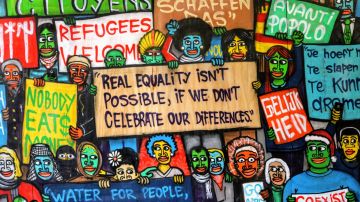When White People Pretend to Be Black, It’s Dangerous
The recent controversy surrounding the white professor, activist, and writer Jessica Krug has highlighted the complexity of the obstacles Black Latinas face

Photo: Unsplash
The recent controversy surrounding the white professor, activist, and writer Jessica Krug has highlighted the complexity of the obstacles Black Latinas face. For Black Latinas, identity is a fraught issue because we defy the comfortable that most people prefer. Are we Latina? Yes. Are we Black? Yes. Here in the United States, where does that leave us?
It’s such an egregious insult when white people pretend to be Black and when white-passing Latinxs claim a “Brown” identity. They have none of the lived experiences, have actively fought to erase and mute ours, yet they want to take the richness of the culture and claim it for themselves when convenient. If you’ve never been stopped by the cops or denied service in establishments because of your skin color, you probably don’t understand what I’m talking about it when it comes to the reality of living in Black or Brown skin.
It’s been incredible to see the evolution and embrace of the “Afro-Latina” identity online over the last few years. It’s pretty hot to claim an “Afro-Latina” or a “Brown Girl” identity. That doesn’t mean that you should jump on the bandwagon to commercialize our identity. That is what these imposters like Jessica Krug, the Instagram influencers pretending to be women of color, and white-passing Latinas launching endless brands claiming to be brown girls are doing. Can’t we honor our racial differences without fetishizing them?
The claiming of an oppressed identity is a truly insidious form of cultural appropriation. You try on this identity for social media, or to promote a book or podcast, and then at the end of the day, take it right back off. It’s not just a problem with white women either, there are tons of Latinxs who grew up checking White as their race their whole lives, and now that we are trendy, they’re hopping on the bandwagon trying to stake a claim to being a Brown girl or an Afro-Latina. You can not be of culture only when it’s convenient.
Las Dolezalitas pic.twitter.com/CO2dYTP9wO
— Myriam Gurba Serrano (@lesbrains) September 3, 2020
The irony is that it shines a light on the fact that the success of these women claiming to be “Black or Brown” lies in their very whiteness. They allow the powers-at-be to claim inclusion, while also choosing to uplift the very whitest folks they can find. Krug’s proximity to whiteness is precisely what made her so palatable to academia and publishing. Her skin color made her less threatening, but her self-assigned identity allowed them to fill their quotas and claim “diversity.” The colorism is so real that these institutions will ignore authentic, acclaimed, and established Afro-Latinas who have been doing the work for years to support someone they find less threatening.
Color-blindness is bullshit and tells POC, “You don’t matter to me, and I don’t see you.” It’s another way that POC experience erasure. They pretend our differences don’t exist to maintain the comfort levels of white people.
Elizabeth Méndez Berry tweeted, “It looks like this fake Afro-Latina may get more press in one day than real Afro-Latinas get in a year.” It’s both a hot and an accurate one (read the whole thread). As an Afro-Latina writer/editor who has struggled for years to get our stories told, our faces shown, and our identities honored even in primarily Latinx spaces, I can confirm the struggle for authentic representation of Afro-Latinas. It’s a long and hard road with seemingly no end in sight.
It looks like this fake Afro-Latina may get more press in one day than real Afro-Latinas get in a year.
— Elizabeth Méndez Berry (@mendezberry) September 4, 2020
I’m not here for all the excessive identity policing that occurs in social media spaces either. I’m just saying if you are trying to claim a lived experience or history that you know is patently false, please take all the seats. Blood, sweat, and tears have gone into fighting for our own identities and making spaces for ourselves. We have to force our way into places where white women and white-passing Latinxs can sashay right through the door.
We need to figure out ways to acknowledge and uphold our identities without commodifying them. There are ways to celebrate our differences and our cultural and ethnic backgrounds without faking it. Trying on the identities of those who have historically been more marginalized than you ever have been or ever will be is a remarkable flex of White privilege that is particularly disgusting.
So, unless you have lived the struggle of a Black or Brown woman, don’t call yourself one. Be an ally. Be a sister. Be a friend. Be an amplifier. Just don’t claim to be something that you’re not.

















